
"Me and Bobby McGee" is a song written by American singer-songwriter Kris Kristofferson and originally performed by Roger Miller. Fred Foster shares the writing credit, as Kristofferson wrote the song based on a suggestion from Foster. A posthumously released version by Janis Joplin topped the U.S. singles chart in 1971, making the song the second posthumously released No. 1 single in U.S. chart history after "(Sittin' On) The Dock of the Bay" by Otis Redding. Gordon Lightfoot released a version that reached number 1 on the Canadian country charts in 1970. Jerry Lee Lewis released a version that was number 1 on the country charts in December 1971/January 1972 as the "B" side of "Would You Take Another Chance On Me." Billboard ranked Joplin's version as the No. 11 song for 1971.

After the Gold Rush is the third studio album by the Canadian-American musician Neil Young, released in September 1970 on Reprise Records, catalogue number RS 6383. It is one of four high-profile solo albums released by the members of folk rock group Crosby, Stills, Nash & Young in the wake of their chart-topping 1970 album Déjà Vu. Young's album consists mainly of country folk music along with several rock tracks, including "Southern Man". The material was inspired by the unproduced Dean Stockwell-Herb Bermann screenplay After the Gold Rush.

"Flashdance... What a Feeling" is a song from the 1983 film Flashdance with music by Giorgio Moroder and lyrics by Keith Forsey and the song's performer, Irene Cara. Moroder had been asked to score the film, and Cara and Forsey wrote most of the lyrics after they were shown the last scene from it in which the main character dances at an audition for a group of judges. They felt that the dancer's ambition to succeed could act as a metaphor for achieving any dream a person has and wrote lyrics that described what it feels like when music inspires someone to dance. The song wound up being used for the scene they watched as well as during the opening credits as the main character is shown working as a welder.
Frank Mills is a Canadian pianist and recording artist, best known for his solo instrumental hit "Music Box Dancer".

"Cinnamon Girl" is a song by Neil Young. It debuted on the 1969 album Everybody Knows This Is Nowhere, which was also Young's first album with backing band Crazy Horse.

"Love Will Keep Us Together" is a song written by Neil Sedaka and Howard Greenfield. It was first recorded by Sedaka in 1973. The brother-sister duo Mac and Katie Kissoon recorded their version of the song in 1973. American pop duo Captain & Tennille covered the song in 1975, with instrumental backing almost entirely by “Captain” Daryl Dragon, with the exception of drums played by Hal Blaine; their version became a worldwide hit.
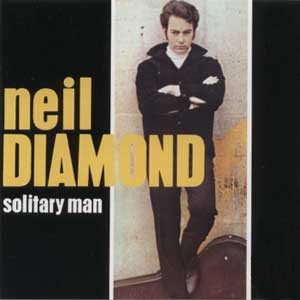
"Solitary Man" is a song that was written and composed by American musician Neil Diamond, who himself initially recorded the song for BANG Records in late January 1966. It has since been covered many times by such artists as Billy Joe Royal, B.J. Thomas, Jay and the Americans, T. G. Sheppard, Gianni Morandi, The Sidewinders, Chris Isaak, Johnny Cash, Johnny Rivers, HIM, Crooked Fingers, Cliff Richard, Ólöf Arnalds, Theuns Jordaan and Farhad Mehrad.

Danny Boy and Other Songs I Love to Sing is the eighth studio album by American pop singer Andy Williams and was released early in 1962 by Columbia Records. This was his first project after leaving Cadence Records, where his albums each had a specific theme, and his first in a series of LPs that covered songs established on stage and screen and other hits from the pop chart and the Great American Songbook. This trend would not be interrupted until his 1966 album The Shadow of Your Smile hinted at a shift toward contemporary material with its inclusion of songs first recorded by the Beatles.

Days of Wine and Roses and Other TV Requests is the eleventh studio album by American pop singer Andy Williams and was released in April 1963 by Columbia Records following his first season as host of his variety series, The Andy Williams Show. The LP has a studio recording of the closing theme from the show, "May Each Day", and continues the format of his previous Columbia releases by including songs from the 1920s, 1930s, 1940s, and 1950s.
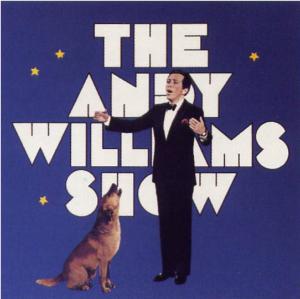
The Andy Williams Show is the twenty-sixth studio album by American pop singer Andy Williams that was released in the fall of 1970 by Columbia Records. In his review on AllMusic.com, William Ruhlmann writes that "The Andy Williams Show LP was not a soundtrack recording from the TV series, and it was not really a live album, although it gets categorized as such. What appears to be the case is that Columbia Records took a group of Williams' studio recordings, most of them made during the summer of 1970 and consisting of his versions of recent soft rock hits, and added a lot of canned applause along with some of the kind of musical interludes used to usher numbers on and off on the show, including bits of its "Moon River" theme music at the start and the finish."

Love Story is the twenty-seventh studio album by American pop singer Andy Williams that was released on February 3, 1971, by Columbia Records. This was another in his series of cover albums, but the title track, subtitled "Where Do I Begin", was the one song included that he originated.

You've Got a Friend is the twenty-eighth studio album by American pop singer Andy Williams, released in August 1971 by Columbia Records. The album bears a striking resemblance to the Johnny Mathis album You've Got a Friend released that same month. Besides sharing their name, the two albums are both made up of covers of easy listening hits of the time, with 11 songs each, and the two albums have seven songs in common that are positioned in a similar order.

Love Theme from "The Godfather" is the twenty-ninth studio album by American pop singer Andy Williams, released on March 21, 1972, by Columbia Records. The two new songs on what was otherwise another LP of covers of hits by other artists were the title track and "Music from Across the Way", which came from the songwriters behind his recent hits "Happy Heart" and "(Where Do I Begin) Love Story".
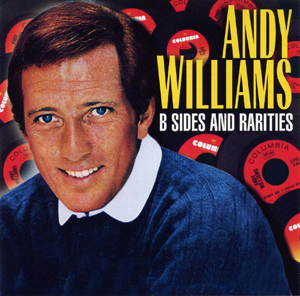
B Sides and Rarities is a compilation album by the American pop singer Andy Williams that was released by Collectables Records on May 27, 2003. Although the collection starts with two 1947 recordings by Kay Thompson and The Williams Brothers, the rest of the material comes from his time at Columbia Records and includes covers of contemporary hits as well as lesser-known material from the songwriters of "Can't Get Used to Losing You", "Home Lovin' Man" and "Moon River".

You've Got a Friend is an album by American pop singer Johnny Mathis that was released on August 11, 1971, by Columbia Records. The phrase "Today's Great Hits" can be found above the title on both sides of the record jacket as well as both sides of the LP label as if to emphasize that this is essentially an album covering songs that were recently on the charts. This was a common practice of many vocalists of the period, so much so in fact that fellow Columbia artist Andy Williams also released an album titled You've Got a Friend in August 1971 on which he coincidentally covers seven of the 11 tracks that Mathis recorded for this album.

Song Sung Blue is an album by American pop singer Johnny Mathis that was released on September 13, 1972, by Columbia Records and featured his renditions of mostly recent chart hits.

Unforgettable – A Musical Tribute to Nat King Cole is a soundtrack album released in the UK in 1983 by the CBS Records division of Columbia in conjunction with the broadcast of American pop singer Johnny Mathis's BBC television concert special of the same name that featured Cole's daughter Natalie. The front of the original album jacket credits the concert performers as "Johnny Mathis and Natalie Cole", whereas the CD booklet reads, "Johnny Mathis with special guest Natalie Cole".
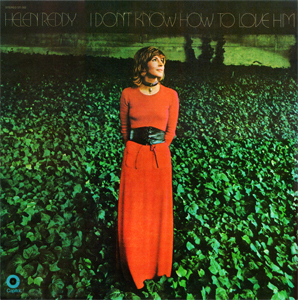
I Don't Know How to Love Him is the debut studio album by Australian-American pop singer Helen Reddy, released on May 10, 1971, by Capitol Records. I Don't Know How to Love Him included her first recording of "I Am Woman". The album made its first appearance on Billboard magazine's Top LP's chart in the issue dated June 5, 1971, and remained there for 37 weeks, peaking at number 100, and got as high as number 40 on the album chart in Canada's RPM magazine. On November 27, 1974, the album received Gold certification from the Recording Industry Association of America, and on March 29, 2005, it was released for the first time on compact disc as one of two albums on one CD, the other album being Reddy's eponymous follow-up that originally came out in the fall of 1971.
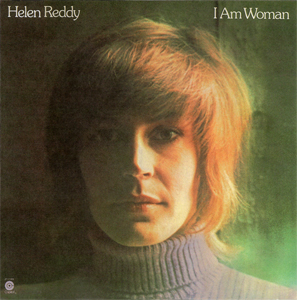
I Am Woman is the third studio album by Australian–American pop singer Helen Reddy, released on 13 November 1972, by Capitol Records. The album included her second recording of the song that gave the album its name, which was also the version that spent a week at number one on the Billboard Hot 100. The album debuted on the Billboard Top LPs & Tape chart in the issue dated December 9, 1972, and reached number 14 during a 62-week run, and in Canada's RPM magazine it peaked at number seven. On March 7, 1973, the Recording Industry Association of America awarded the album with Gold certification for sales of 500,000 copies in the United States, and Platinum certification for sales of one million copies came on December 5, 1991. On July 22, 2003, it was released for the first time on compact disc as one of two albums on one CD, the other album being her 1973 release Long Hard Climb.
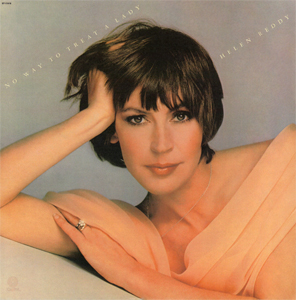
No Way to Treat a Lady is the seventh studio album by Australian-American pop singer Helen Reddy that was released in the summer of 1975 by Capitol Records and found Reddy tackling country pop, bossa nova and blues. The album debuted on Billboard's Top LP's & Tapes chart in the issue dated July 12, 1975, and peaked at number 11 over the course of 34 weeks, and on the album chart in Canada's RPM magazine it got as high as number 13. On January 19, 1976, the Recording Industry Association of America awarded the album with Gold certification for sales of 500,000 copies in the United States, and on August 23, 2005, it was released for the first time on compact disc as one of two albums on one CD, the other album being her 1976 release, Music, Music.



















